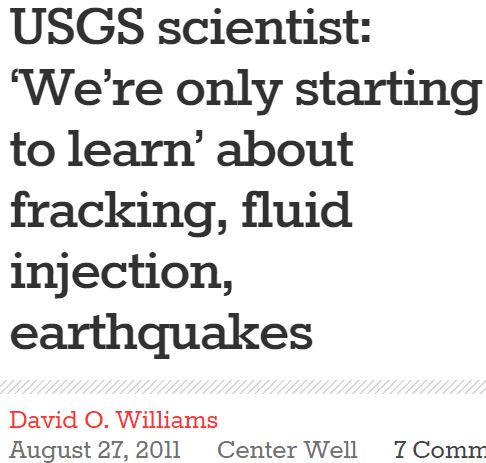Calls to revive fracking amid gas crisis spark angry response in Lancashire, An industry body has called on the Government to consider reviving the fracking industry, two years on from the moratorium that stopped gas exploration in Lancashire by Tim Gavell, Nov 4, 2021, Lancashire Post
The UK Onshore Oil and Gas group has said, as the COP26 environmental conference in Glasgow is under way, that fracking for gas in places like Little Plumpton would give the UK a smaller carbon footprint than from importing gas from abroad.
The call follows a recent article in national newspaper Daily Mail championing fracking and admonishing Blackpool for failing to capitalise on underground gas reserves at a time when prices were rocketing due to restrictions in supply from abroad.
But locals have hit back rubbishing the Mail article and saying that the fracking industry would be expensive, cause more local earth tremors and contribute even more to the greenhouse gas emissions threatening to raise global temperatures to dangerous levels.
The Government announced the halt to fracking on November 2, 2020 citing tremors felt in Fylde homes linked to the drilling by Cuadrilla and following huge protests against the industry.
Martin York, chairman of UKOOG, said: “Two years ago, the UK Government imposed a moratorium on hydraulic fracturing in England, pulling the handbrake on an industry which could have provided well-paid UK jobs, reduced the UK’s gas supply carbon footprint and levelled up the UK economy.
“Furthermore, by importing liquified natural gas (LNG) instead of producing natural gas domestically, the UK has been able to ‘offshore’ around 110 million tonnes CO2e from its carbon balance sheet since 2005, the equivalent annual heating emissions of 37 million homes.
“LNG has a delivered carbon intensity around 4 times that of UK shale gas – and the failure to exploit the abundant Bowland-Hodder shale will add a forecasted further 150 million tonnes to the UK’s global carbon footprint by 2050.
Fracking attracted repeated protests in Lancashire
“As COP 26 progresses, the onshore oil and gas sector’s point remains valid: if the UK wishes to achieve a net zero economy, a continued reliance on fuels from imported sources at unknown prices and at higher carbon intensities does not reflect a resilient and considered energy strategy.
“On the second anniversary of the moratorium, we request that the Government take a rational stance on the perceived risks and low risks associated with hydraulic fracturing and recognise the benefits that previous governments have well understood.”
A Frack Free Lancashire spokesman said: “The fracking industry lurches on like a zombie that doesn’t know it’s dead – a real Hallowe’en nightmare.
“UKOOG seems not to understand that the climate crisis is global not national. It does not matter where the UK’s gas consumption emissions are generated. They still have the same impact on global heating.
Security at the Lancashire site remains strong despite a lack of activity
“Their naive suggestion that Carbon Capture and Storage is going to be a lifeline for their moribund industry ignores the obvious fact that CCS remains a theoretical practice with no at scale projects anywhere near completion today. It is a fantasy.
“On the second anniversary of the moratorium, and in the midst of the all-crucial COP26 talks, we request that the government continues take a rational stance on the manifest risks associated with hydraulic fracturing and recognise the requirement to move swiftly to a green and sustainable economy in which fracking has no place at all.”
On the Daily Mail article entitled Frack us back from the Brink which suggested Blackpool would benefit from well paid fracking jobs, County Coun John Singleton said: “This method of operation will only provide jobs for the experienced and qualified engineers.
“There have been many instances of earth tremors such as the one in Little Plumpton which was 2.9 magnitude at the drilling site in August 2019.
“Previous operations at a former fracking site, not too far from the above site, recorded a magnitude of 2.3 earthquake on the Richter scale back in 2011 and 2018. Work on this platform was then suspended.”
Work at the Lancashire site was suspended after a series of tremors linked to the fracking operation where water and chemicals is pumped under pressure into deep-lying shale rock to release the methane trapped therein.
The Government said the moratorium will not be lifted until “compelling scientific evidence” can be produced to show that fracking tremors can be better predicted and controlled.
Studies commissioned by the Oil and Gas Authority and carried out by the British geological Survey on the two fracked wells at the Preston New Road fracking site in March 2020 concluded that “it is not yet possible to accurately predict the seismic response to hydraulic fracturing” and that “where induced seismicity has occurred, mitigation measures have shown only limited success, and there can only be low confidence in their effectiveness”

Refer also to:

2013: Radioactive water from Lancashire fracking site
2013: “Many fleas make big dog move” : Jessica Ernst’s inspirational talk in St. Anne’s, Lancashire UK
2014: Nearly 2,000 Lancashire UK residents join legal bid to block fracking under their homes
